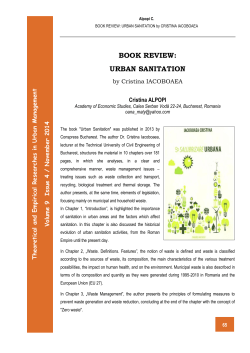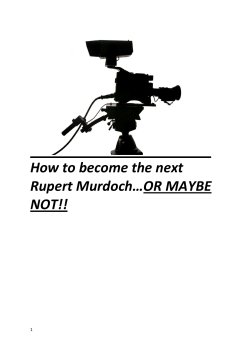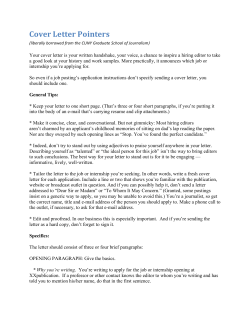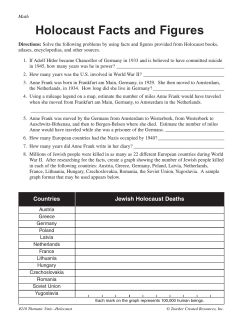
Media and Communication ESA RN18 CONFERENCE Renewal, Reform or Revolution?
Faculty of Journalism and Communication Sciences ESA RN18 CONFERENCE Media and Communication in and after the Global Capitalist Crisis: European Sociological Association Research Network 18 Sociology of Communications and Media Research Renewal, Reform or Revolution? Hosted by the University of Bucharest Faculty of Journalism and Communication Studies Conference Venue University of Bucharest, Rectorate Building and Faculty of Law Kogalniceanu Blvd, 36-46, 050107 Bucharest Stoicescu Hall (first floor) Senate Hall (ground floor) Organising Committee: Christian Fuchs, University of Wesminster, UK George Pleios, University of Athens, Greece Romina Surugiu, University of Bucharest, Romania Alexandra Bardan, University of Bucharest, Romania Aurelia Vasile, University of Bucharest, Romania Carolina Rudinschi, University of Bucharest, Romania ESA RN18 CONFERENCE PROGRAM Bucharest October 17-18, 2014 Friday, October 17 09:00-10:00 10:00-10:15 Registration Opening and Welcome - Stoicescu Hall (first floor) Christian Fuchs, University of Westminster, Chair of the RN18 of ESA Viorica Păuș, University of Bucharest, Dean of Faculty of Journalism and Communication Studies Mihai Coman, University of Bucharest, Director of the Doctoral School in Communication Studies 10:15-11:30 PLENARY SESSION Stoicescu Hall (first floor) Peter Ludes (Jacobs University Bremen, Germany) Wanted: Critical Visual Theories! Christian Fuchs Keynote Talk: Chair: Abstract The “flows of messages and images,” are, according to Manuel Castells (1996: 508) the “basic thread of our social structure,” implying that “image-making is power-making” (ibid. 507). These visual networks, however, are however rarely the focus of research. This has even been the case in ESA’s Research Network 18 that focuses on media sociology. Castells himself did not pay particular attention to this thread in his later publications. More recently, Nye (2011: xiii) has specified that visual narratives contribute to “the public determination of legitimacy, good and evil – and the shaping of the preferences of one‘s opponents”. Visual information and communication technologies, forums, and formats are put to use in order to show or cover up social relations, which they pretend to unveil. Moreover, increasingly intelligent devices and national security agencies exceed by far the surveillance conducted by traditional webcams and CCTV. “Critical” visual theories, joining forces with whistleblowers and critical media professionals, should discover systematic neglects and hidings and allow for an ongoing critique of nationalism, power, exploitation, and manipulation. Fundamental criticism uncovering hidden visual patterns and strategies can offer alternatives to the more conventional text-bound study of social actions, processes, or structures. In particular, it is necessary to break out of partisan national or class views into a multicultural and multiperspective mode of seeing, interpreting, and explaining. This call for a (self-) critical visual turn in the sociology of communications and media research will, in part 1, offer examples for the continuity of highly biased national visual horizons in Brazil, China, Germany, and the U.S. Analyses of TV Centennial and Annual Reviews will compare dominant power and knowledge presentation patterns. The centennial reviews show a continuation of national priorities and perspectives and imply a perseverance of stereotypes that privilege very few countries, issues, and types of actors. 2 The 20th century preponderance of soldiers and heads of state, all male, changed significantly during the past decade, especially after the global financial crisis since 2008. After an extreme focus on international politics and the "war on terror", the "irrationality of financial markets" and new types of knowledge and ignorance turned a little bit more (tele-) visible. Whether this presentation shift can be interpreted as a visual indicator of a power shift in favour of common people and a spurt in functional democratization is open to question. Part 2 will zoom in on the systematic neglect of the most powerful global actors, networks, and corporations by visualizing public spheres. A recent Oxfam report (2014: 5) specified that: "one percent of the world’s families own almost half (46 percent) of the world’s wealth". Both, the few thousand families and corporations dominating world economy and the billions of people living and dying in relative poverty usually remain beyond journalistic scrutiny and sociological theories. The concluding part will suggest a few key terms and theoretical strands for critical visual theories, emphasizing perspectives on long-term, international, usually hidden visual conventions and strategies. References Castells, Manuel. (1996) 2000. The Information Age: Economy, Society and Culture, vol. 1: The Rise of the Network Society. Cambridge, MA: Blackwell. Nye, Joseph S. 2011. The Future of Power. New York: Public Affairs. Oxfam Briefing Paper (20 January 2014): "WORKING FOR THE FEW: Political capture and economic inequality." Oxfam: Oxfam House, Oxford, UK. Biography: Peter Ludes holds PhDs from the University of Trier (1978, thesis on Marx's Notion of a Classless Society) and Brandeis University (1983, thesis on Chances and Limits for Alternatives). He has held Visiting Positions at the University of Newfoundland, Canada (1981/82), the University of Amsterdam (1987), and a Research Fellowship at the Center for European Studies at Harvard University (1989). He was an Associate Professor for Culture and Media at the University of Siegen (1992-2002), for Media and Communication at the University of Mannheim (1994-96), and a Visiting Professor at the University of Constance (2001). He initiated the Project News Enlightenment http://www.nachrichtenaufklaerung.de in 1997. From 1997 to 2008, he was the Deputy chair of the ESA Research Network ”Mass Media and Communications”, and from 2008 to 2011 he was, together with Roy Panagiotopoulou, the Co-Chair of the re-named ESA Research Network 18 "Sociology of Communications and Media Research". Since 2002 he has been a Professor of Mass Communication at Jacobs University Bremen, Germany. Since 2003 he has conducted research projects, together with the computer scientist Otthein Herzog, on the semi-automatic detection of key visuals in videos. https://www.jacobs-university.de/directory/pludes http://www.keyvisuals.org https://www.jacobs-university.de/iss-program 3 Friday, October 17 Friday, October 17 11:30 – 12:00 Coffee Break 11:30 – 12:00 Coffee Break 12:00 – 13:30 PARALLEL SESSION 1A Social Movements and Social Media in Times of Capitalist Crisis Romina Surugiu Stoicescu Hall (first floor) 12:00 – 13:30 PARALLEL SESSION 1B The Media and Social Representations Chair: Daniela Rovența-Frumușani Senate Hall (ground floor) Chair: Christian Fuchs (University of Westminster, UK) OccupyMedia! The Problem of Organising Critical Media in Capitalism against Capitalism Andrea Plöger (Rosa Luxemburg Foundation, World Social Forum TV, Germany) Media Activism on a Transnational Scale: The World Forum for Free Media and Communication Rights: Achievements and Challenges Delia Dumitrică (St. Louis University – Madrid, Spain), Maria Bakardjieva (University of Calgary, Canada) A ‘Status-Update Away’: Deconstructing the Hype around Social Media Enabled Civic Mobilization Olga Baysha (National Research University Higher School of Economics, Russia) On Alternative Critical Media From a Global Perspective 4 Gábor Sarlós (ELTE University Budapest, Hungary) The Role of the Media in the Hungarian Nuclear Energy Perception Alexandra Bardan (University of Bucharest, Romania) Freelance Photojournalism in Romania: A Change of Model? Aurelia Ana Vasile (University of Bucharest, Romania) Tailoring Discourse to Crisis: The Lambda Structure of Political Discourse Georgeta Drulă (University of Bucharest, Romania) News Repertoires and Media Repertoires from the Mobile Devices Users’ Perspective 5 Friday, October 17 Friday, October 17 13:30 – 14:30 Lunch 13:30 – 14:30 Lunch 14:30 – 16:00 PARALLEL SESSION 2A Digital Media and Capitalism Today Christian Fuchs Stoicescu Hall (first floor) 14:30 – 16:00 PARALLEL SESSION 2B Media and Democracy Peter Ludes Senate Hall (ground floor) Chair: Andreas Wittel (Nottingham Trent University, UK) The Economy of Contribution in the Digital Commons Jernej Amon Prodnik (Charles University, Czech Republic) The Brave New Social Media: Contradictions of Digital Communication Technologies Joss Hands (Anglia Ruskin University, UK) You Are a Gadget: Digital Agency & Class Consciousness Pedro Lisdero (CIECS (CONICET, UNC) / CIES, Argentina), Martin Eynard (CIECS (CONICET, UNC), Argentina) Labour Exploitation and Resistance(s) in the Ground and the Cloud: Body, Call Centers and Social Protests in Argentina. 6 Chair: Gilles Verpraet (CNRS University Paris Ouest, France) Differentiation of the Public Sphere between Democratization and Financial Crisis Roy Panagiotopoulou (University of Athens, Greece) Euroscepticism and the Extreme Right: An Upcoming European Political Trend or a Marginal National Phenomenon? Nikos Fokas (Eotvos Lorand University, Hungary), George Pleios (University of Athens, Greece), István Micsinai (Eotvos Lorand University, Hungary), Gergely Tóth (Eotvos Lorand University, Hungary), Gábor Jelenfi (Eotvos Lorand University, Hungary) Age of Introversion? European Parliamentary Elections and Cognitive Maps in the Media. Istvan Micsinai, Gergő Tóth, Nikos Fokas, Gábor Jelenfi, Zoltán Előd (Eotvos Lorand University, Hungary): Media Dynamics, Sensations and Campaigns - Comparing two Parliamentary Election Campaigns in Hungary (2010, 2014) 7 Friday, October 17 16:30 – 17:00 17:00 – 18:30 Chair: Speakers: Special guest: Coffee Break Book Expo (Sage - UK, Tritonic - Romania) PLENARY SESSION Public Media and Alternative Journalism in Romania Val Vîlcu, University of Bucharest Stoicescu Hall (first floor) Dr. Raluca Petre (‘Ovidius’University Constanta, Romania) On the Distinction between State and Public Media: Re-centering public options Dr. Antonio Momoc (University of Bucharest, Romania) Alternative media as public service journalism Costi Rogozanu (Journalist and media activist, criticatac.ro) Is alternative media an alternative? Dr. Val Vîlcu (Journalist and Lecturer in Journalism, University of Bucharest, Romania) Trends in Online Journalism Dr. Stelian Tănase Chairman of Board of Directors and CEO of Romanian Public Television. Abstract: In their presentations, the speakers will address the problem of public media and alternative journalism in Romania, in the context of the acute financial crisis and the loss of the credibility of the Romanian Public Service Television and Radio Networks. Raluca Petre will introduce a discussion that has not really occurred in Romania after the fall of the authoritarian regime, namely the distinction between public and state media systems. Her argument is conceptually grounded in the classic Weberian distinction between authority and power. She argues that while a public media system is based on authority and consequently legitimate, a state media system is built on power, thus potentially discretionary. The common element in the two cases is governmental spending and support. Nevertheless, while a public media system is built on a ‘bottom up’ logic, with public accountability running high, a state media system is constructed on a ‘top down’logic, where public scrutiny is not really being considered. 8 After 1989, the Central and Eastern European countries refuted the state media systems, but did not really reconsider a public media system as alternative in the early nineties. Meanwhile, in Western Europe, the legitimacy of public media systems was as well been questioned in the context of the new ethos of free market. The alternative at hand in CEE has been the commercial media system. Antonio Momoc and Costi Rogozanu will reflect on how alternative media could replace public service in a time of distrust in the public radio and TV stations (which are suspected of being politically controlled, according to the reports of the media monitoring agencies). Their presentations will address the issue of alternative media as a new form of public service that can serve the citizens’ interest. To reach an answer, speakers will analyse the alternative media in Romania (Costi Rogozanu), as well as the social media and blogs of the public service representatives (Antonio Momoc). In a concluding speech, Val Vîlcu will try to identify and analyse major trends in online journalism in Romania. Raluca Petre received her PhD in Sociology in 2009 from the Graduate School for Social Research, Polish Academy of Science, Warsaw. Her MA background is in Economy & Society, from CEU & Lancaster University, and her BA in Communication Sciences, from the University of Bucharest. In 2012, she published the book: Journalism in Times of Major Changes: Critical perspectives. Tritonic, București. Antonio Momoc, PhD in Sociology, 2009, University of Bucharest, MA in Political Studies, BA in Journalism and Political Studies. Antonio Momoc’s main research interests are in journalism, new media, political sciences and political communication. www.antoniomomoc.ro Costi Rogozanu is a journalist and media activist. He has worked for the Romanian mainstream media for several years and is now one of the editors of the Romanian online publication criticatac.ro, focused on social, intellectual and political critique. He is author of “Carte de munca” (Work Book), Tact, 2013 and one of the editors of “Iluzia anticomunismului” (The Illusion of AntiCommunism), Cartier, 2008. Val Vîlcu is a journalist and Lecturer in Journalism at the University of Bucharest, and vice-dean of the Faculty of Journalism and Communication Studies. He holds a PhD in Sociology. He is particularly interested in researching online journalism and social journalism in Romania. 20:00 Restaurant: Conference Dinner Hotel Siqua - Amarillis Restaurant Calea Plevnei 59A, 010223, București www.hotelsiqua.ro/en/restaurant-bar 9 Saturday, October 18 Saturday, October 18 09:30 – 11:00 PARALLEL SESSION 3A Media and the Financial Crisis 09:30 – 11:00 Chair: Peter Ludes Stoicescu Hall (first floor) Chair: Steven Harkins (University of Sheffield, UK) Poor Sources: Constructing the British ‘Underclass’ following the 2007/8 Financial Crash. Maria Cernat (Christian University Dimitrie Cantemir, Romania) Financial Journalism and Financial Crisis: the Role of the Press in the 2008 Economic Crash Sophie Knowles (Murdoch University, Australia) The Development of Neo-Liberal Discourse within Mainstream Financial Journalism: From the 1980s to the Global Financial Crisis Ana-Maria Teodorescu (University of Bucharest, Romania) Business in the News during the Crisis? Implications for Corporate Public Relations in the Romanian Media in 2014 10 PARALLEL SESSION 3B The Media and Right-Wing Movements and Ideologies Today Oana Băluță Senate Hall (ground floor) Padmaja Shaw (Osmania University, India) The Making of an Omnipresent, Omniscient Leader George Pleios (University of Athens, Greece) Crisis, Media and the Comeback of Fascism. The Golden Down Case Panos Kompatsiaris (University of Edinburgh, UK), Yiannis Mylonas (Moscow State University, Russia) The Rise of Nazism and the Web: Social Media as platforms of Racist Discourses in the Context of the Greek Economic Crisis Nikos Fokas (Eotvos Lorand University, Hungary), Orestes Fokas (Daily Economy, Hungary), Gergő Tóth (Eotvos Lorand University, Hungary), Anikó Félix (Eotvos Lorand University, Hungary) The Reality of Mass Media and the Rise of Jobbik in Hungarian Political Life: Roma/Gipsy Topics in the Hungarian Dailies and Parliamentary Speeches between 2002 and 2014 11 Saturday, October 18 Saturday, October 18 11:00 – 11:30 Coffee Break 11:00 – 11:30 Coffee Break 11:30 – 13:00 PARALLEL SESSION 4A Media, Culture, Capitalism, and Labour Christian Fuchs Stoicescu Hall (first floor) 11:30 – 13:00 PARALLEL SESSION 4B Public Service Media and the Public Sphere Today Raluca Petre Senate Hall (ground floor) Chair: Chair: Dane S. Claussen (Shanghai International Studies University, China) The Rot Runs Deep: Industry, Professional, Educational, and Personal Barriers to Improving US Business, Financial and Economic Journalism Paško Bilić and Ivona Ondelj (Institute for Development and International Relations, Croatia) Pushing the Croatian PBS over the Edge? An Assessment of the Impact of State Aid Rules Jakaș Primorac (Institute for Development and International Relations, Croatia) Living on the Edge? Work and Employment in the Croatian Audio-Visual Industry Christian Lamour (CEPS/INSTEAD, France) The Strength of the Margin: The Transformative Use of the Free Dailies in the Greater Luxembourg Public Sphere Mahnaz Heidari Nazari (University of Teheran, Iran) The Circuit of Culture: A Case Study of the Glasgow University Media Group (GUMG) Mihaela Gavrilă (Sapienza University of Rome, Italy) The Future through the Eyes of the Young: Rethinking the Italian Public Broadcasting Service Romina Surugiu (University of Bucharest, Romania) On the Changing Identities of Digital Journalists Mouli Bentman (The Open University of Israel), Michael Dahan (Sapir College, Israel) Public Broadcasting is Very Important: So Let's Kill It 12 13 Saturday, October 18 Saturday, October 18 13:00 – 14:00 Lunch 13:00 – 14:00 Lunch 14:00 – 15:30 PARALLEL SESSION 5A Transformations of the Media and Journalism in the Information Age Christian Fuchs Room 120 (ground floor) 14:00 – 15:30 PARALLEL SESSION 5B The Media, News, Social Movements and Alternatives George Pleios Senate Hall (ground floor) Chair: Ivo Furman (Goldsmiths College, UK) Harnessing the Demand for Free Speech in Turkey: A Case-Study of Produsage on eksisözluk̈ .com Helena Popović (University of Zagreb, Croatia) Journalism Practices and Media Content: How to Break Out from the Vicious Circle? Dimitris Boucas (LSE, UK) Citizen Networks and New Media in Greece in the Context of the Financial Crisis Mădălina Moraru (University of Bucharest, Romania) Media and Advertising – Friends or Enemies during the Romanian Economic Crisis? 14 Chair: Alejandro Abraham-Hamanoiel Rodriguez (Goldsmiths College, UK) #YoSoy132 and the Grammar of the New Protest Movements Liu Shih-Chun (National Chengchi University, Taiwan) Mediating the Sunflower Movement: Hybrid Media Networks in a Digital Age Jorge Saavedra Utman (Goldsmiths College, UK) Social Movements and Media Democratization in a Neoliberal Country: The Case of Chile Lisa Bogerts (University of Augsburg, Germany) "Merry Crisis and a Happy New Fear“: Street Art and the Media 15
© Copyright 2025





















